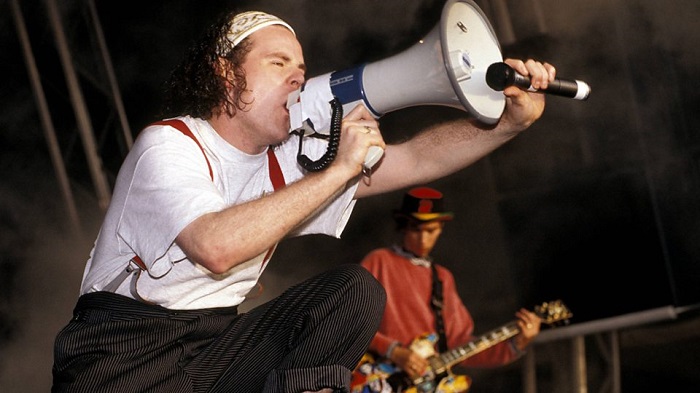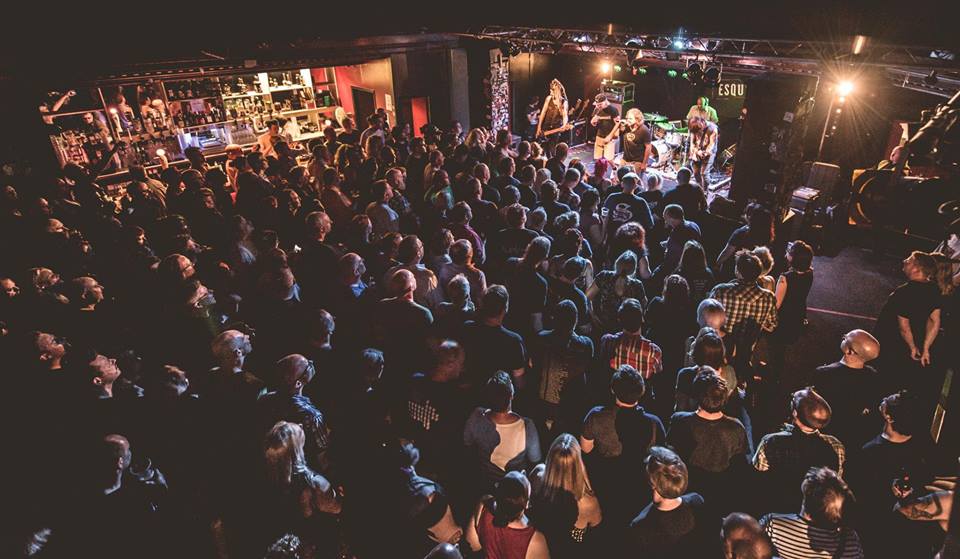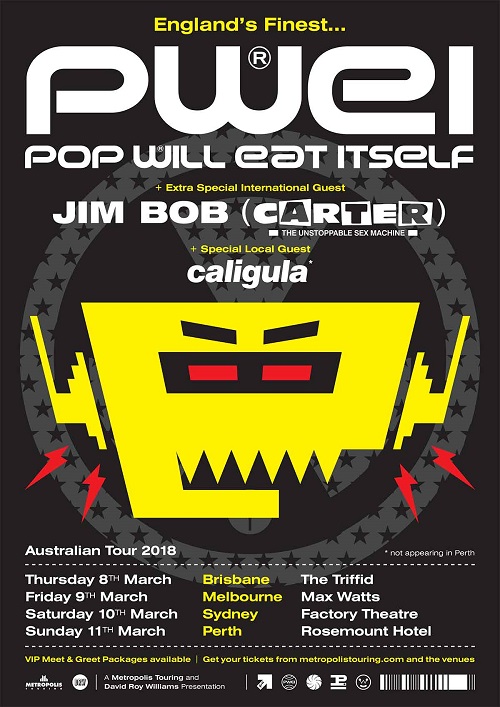Project Description
Interview
with
GRAHAM CRABB
from
POP WILL EAT ITSELF
.
.
Straddled between the end of one decade in the punk scene and the start of another decade in the emerging dance and acid house scene, the tale English outfit Pop Will Eat Itself (PWEI) is one that few bands can lay claim to. Affectionately known as The Poppies, founding member Graham Crabb takes time out to speak with us about the bands history, defining moments and upcoming tour of Australia.
.
.
Hi Graham and thanks for taking the time out to speak with us at Amnplify.
You will be returning to our shores in early March 2018 not just to perform but to perform alongside (Jim Bob) Carter as a double bill treat for fans. When was the seed for this tour planted and also securing Carter to join you?
It was fairly recently really. I came back to Australia about three years ago and we were asked to come over again. We were trying to put a bill together, there were various bands who were put forward and nearly made it but the one who made it was Jim Bob and we were very pleased with that. It should be a great bill.
Last time I had the pleasure of watching you guys was back in 95 at the Alternative Nations festival and like any of your sets it was a high octane performance. A factor that is synonymous with all your live shows which begs the questions, is the high energy element fundamental to the delivery of messages you were trying to convey or simply a by-product of music you wanted to create?
I think it goes hand in hand really. You can listen to a record and sense that energy that is there and when we play live we don’t want to disappoint. We want to bring the best out of that tune and the energy that is there in the music. We want to bring that out live and quite often you can tell the reaction of the audience, particularly in Australia, the crowd get it and respond. It is that type of thing that we feed off them and they feed off us. That is a typical PWEI show.
You will of course be performing some of your iconic songs on this tour and with the benefit of hindsight, in the years that elapsed since their initial release, how do you view these tracks as cemented in time and their enduring influence on the musical landscape?
I kind of listen to what other people have to say and what is generally said is that the stuff is timeless and you wouldn’t have guessed that some of the tracks were made 20 years ago. Maybe some of the sample heavy tracks you do just because people don’t get away with using big chunks of samples anymore so I guess that dates some of the tracks in a way. The tracks where the samples aren’t so obvious, it’s nice to hear people say that those tunes are timeless and they are as good today as they were then.
.
.
Pioneers of the industrial electro sound and at the forefront of the indie scene as well as a voice of a generation. How has the vision of a Wise Up Sucker Briton unfolded in terms of where you thought it may go and where it is today?
Well it has taken a bit of a strange turn with Brexit. I think in the years leading up to Brexit you knew that there was dissatisfaction and that something was going to kick off. Everyone has their own take on it but for me Brexit is the wrong time to revolt. Politics have been in a bad way for a while and politicians need to be put in their place. We gave them the vote for Brexit and they used it to show their dissatisfaction. That has kind of spiralled really from 20 odd years ago when we are talking about Watchmen and Def Con One. That was a government that was trying to force people to do things against their will and that is what you get in the end.
In the context of history over the last 20 years and that of the bands history, what were the pivotal moments that shaped those defining albums and to a greater extent your success?
I guess first of all getting into a studio with all the samplers and technology, having access to all of that definitely shaped us. Prior to that we had been on a big European tour and going out to clubs after gigs, which we hadn’t done a lot of before then and we were listening to a lot of remixes and perhaps a more modern sound which we had been wanting to get into. Hip hop took off big time and acid house took off and this all coincided with our experimentation with our technology. Those things shaped the band permanently in terms of what we were which was pop punk band into a technology inspired beast.
Aside from the technological advantages and emerging scenes such as hip hop, having met so many different musicians and interesting characters throughout the years, were there any words of wisdom spoken to you that really resonated with you and altered the way you approached your craft?
Yeah we played with Public Enemy and it didn’t go down to well. The crowd booed us off the stage and Chuck D was great afterwards, he said listen, when Public Enemy started out we weren’t considered hip hop because we played white noise and sirens behind beats and people didn’t get it. He said you just have to carry on and hammer anyway until they get it because one day they will get it. Those were great words really and we needed it at the time, the encouragement with how Public Enemy were outsiders and then came to be the defining band of the movement.
.
.
Every artist evolves not just emotionally from one album to the next but also musically and these two factors would be particularly poignant for PWEI considering the use of technology in the studio and that of a maturing punk ethic. How did you align these two elements throughout your career when considering 1987’s Box Frenzy through to 2015’s Anti-Nasty League?
You always keep one eye on your roots. For us the punk stage is still there all the time whether we are doing fast thrash numbers or something with a hip hop groove or a bit more electronic but the root of every album is that kind of spikiness that we use to keep things interesting.
Never one to stand still, you went onto Golden Claw Musics and alongside Richard March to form Bentley Rhythm Ace post PWEI. Were these projects an opportunity for you to explore some boundaries that were beyond the realms of PWEI?
I’m not sure if they were beyond the realms of PWEI but at the time I think everyone was a bit frazzled from doing nine months on the road touring with PWEI and it was just good therapy to do something else. They did pretty well and were reasonably successful. Richard is actually joining us for these dates which is good news. The solo side of things is just something to keep yourself fresh really and not feel tied down. It’s like taking a break.
After the reformation of 2011 and now for 2018, what if any are the greatest challenges / rewards of performing live and bringing the PWEI experience to fans?
It is every bit as exciting playing the old tracks as well as the new tracks and seeing how they went down. Something that a band has to deal with is when you hit the public arena for the first time, that is how you are defined and you can’t really get anyway from that. There are certain tunes that people will hold up as the essential PWEI tunes because they were of an era and when they first discovered the band and when we were first thrusted into the spot light. It is good to hear that people still like the new stuff as well. We play a mix of both but there is certainly a reliance on the tunes people want to hear, they want to hear them, they want to jump around.
.
.
It is always hard to pin point just a few highlight gigs bearing in mind how many you have played over the years but can you share with us a standout performance and what made it so memorable?
I particularly remember playing the Old Greek Theatre in Melbourne, fantastic gig, went down really well, and went to get off thestage at the side, tripped and broke my ankle and spent the rest of the tour on a frame Spinal Tap style.
Lastly Graham, what does music give you that nothing else does?
It is a release I suppose, a chance to explore yourself and what you feel. I think you are always trying to recreate the feeling you got when you first got into music and how it touched you and the hairs on the back of your neck stood up and you never forget those moments and the bands that did that for you. I think you strive to be that band that does that for other people. The real reward is when people come to you and tell you how much you mean to them and those are the great moments you try to achieve.
.
.











